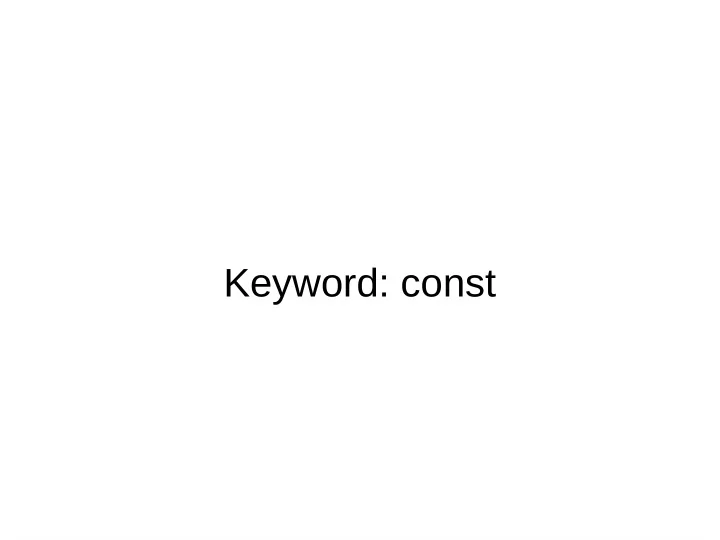

Keyword: const
const class Bank { public: Money AccountBalance(int id) const; int Withdraw(int id, const Money &money); private: const unsigned int ACCOUNTS; //Not used const static unsigned int MAX_ACCOUNTS = 10; }; //Not used const int baz = 5; int* const foo = &baz; const int* bar = &baz; ● Constants can take many different forms...
Constant “Variable” class Bank { public: Money AccountBalance(int id) const; int Withdraw(int id, const Money &money); private: const unsigned int ACCOUNTS; //Not used const static unsigned int MAX_ACCOUNTS = 10; }; //Not used const int baz = 5; int* const foo = &baz; const int* bar = &baz; ● Data stored can not be changed ● Useful for naming literal values (e.g. PI=3.14...) ● When applied to objects, the object can only call Constant Member Functions
Constant Pointer class Bank { public: Money AccountBalance(int id) const; int Withdraw(int id, const Money &money); private: const unsigned int ACCOUNTS; //Not used const static unsigned int MAX_ACCOUNTS = 10; }; //Not used const int baz = 5; int* const foo = &baz; const int* bar = &baz; ● Pointer always points to the same location ● But data pointed to can change ● Useful for protecting buffer locations when passing to functions
Pointer to a Constant class Bank { public: Money AccountBalance(int id) const; int Withdraw(int id, const Money &money); private: const unsigned int ACCOUNTS; //Not used const static unsigned int MAX_ACCOUNTS = 10; }; //Not used const int baz = 5; int* const foo = &baz; const int* bar = &baz; ● Pointer can be updated to point to other addresses ● But data pointed to can not be changed ● Useful for marking read-only data when passing to functions
Constant Reference class Bank { public: Money AccountBalance(int id) const; int Withdraw(int id, const Money &money); private: const unsigned int ACCOUNTS; //Not used const static unsigned int MAX_ACCOUNTS = 10; }; //Not used const int baz = 5; int* const foo = &baz; const int* bar = &baz; ● Same effect as Pointer to a Constant ● But the syntax is as if the variable was passed by value
Constant Member Data class Bank { public: Money AccountBalance(int id) const; int Withdraw(int id, const Money &money); private: const unsigned int ACCOUNTS; //Not used const static unsigned int MAX_ACCOUNTS = 10; }; //Not used const int baz = 5; int* const foo = &baz; const int* bar = &baz; ● Same effect as Constant “Variable” except is applied to an object's scope ● Can only be initialized within the constructor within the initialization list – e.g. Bank::Bank() : ACCOUNTS(10) { //Constructor }
Constant Class Data class Bank { public: Money AccountBalance(int id) const; int Withdraw(int id, const Money &money); private: const unsigned int ACCOUNTS; //Not used const static unsigned int MAX_ACCOUNTS = 10; }; //Not used const int baz = 5; int* const foo = &baz; const int* bar = &baz; ● Same effect as Constant “Variable” except is applied to an classes' scope ● This means you don't need an object to access it – e.g. Math::PI
Constant Member Functions class Bank { public: Money AccountBalance(int id) const; int Withdraw(int id, const Money &money); private: const unsigned int ACCOUNTS; //Not used const static unsigned int MAX_ACCOUNTS = 10; }; //Not used const int baz = 5; int* const foo = &baz; const int* bar = &baz; ● Signals that the function does not modify any member data ● Useful in preventing accessor functions from accidentally modifying data
Recommend
More recommend